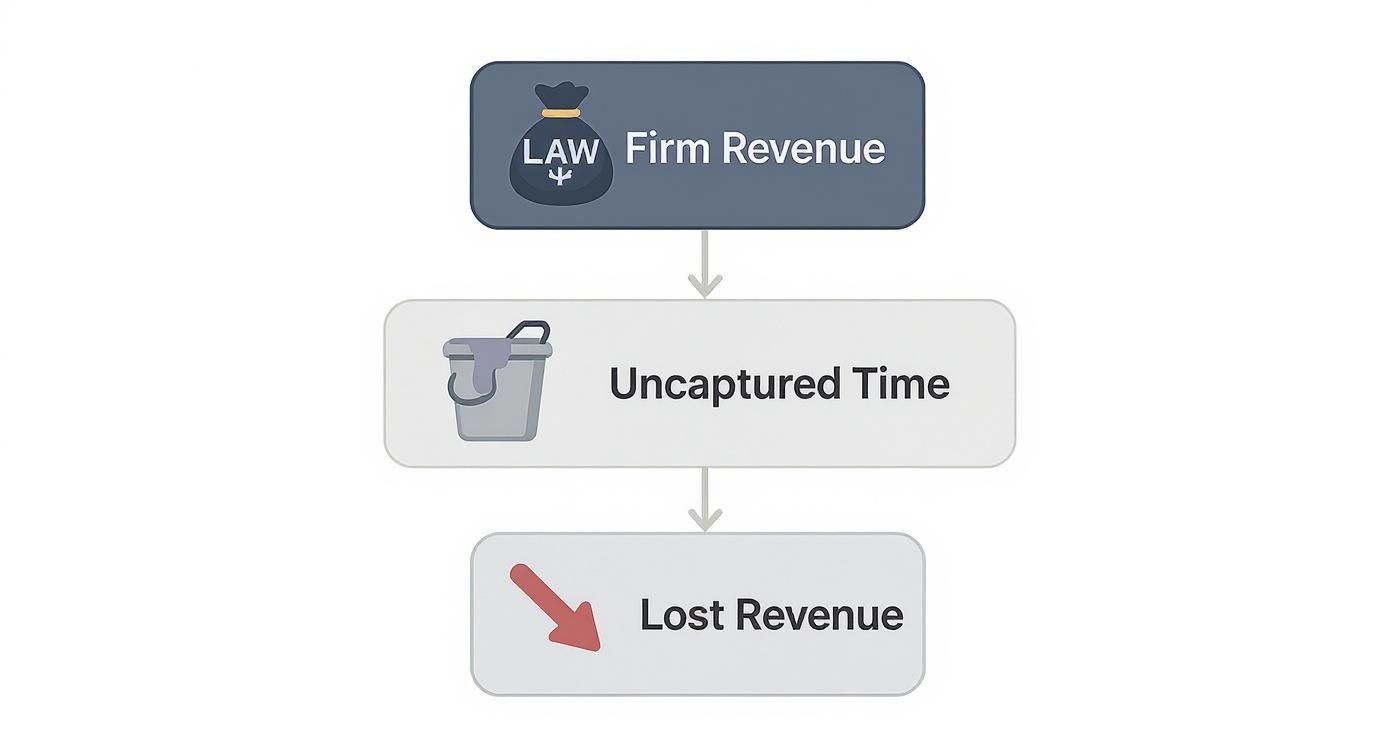For lawyers, time tracking software isn't just another tool—it's the core engine that turns every billable minute directly into revenue. It's designed to plug the financial leaks that spring from unrecorded phone calls, quick emails, and brief research sessions, making sure your firm's hard work is always compensated.
Why Every Billable Minute Matters
Think of your law firm's revenue as a large bucket of water, filled by your team's diligent work. Now, imagine tiny, almost invisible leaks. A five-minute call here, ten minutes of research there, a quick email reply—each one is just a small drip.
Individually, they feel insignificant. But together, they create a steady drain on your firm's profitability, day in and day out. This is the reality of practicing law without a precise way to track time.
Every single unrecorded task is lost income. It's so easy to forget these small moments when you're juggling multiple cases and constant client demands. The old-school method of trying to piece your day back together on a spreadsheet isn't just a headache; it's fundamentally flawed. It forces you to rely on memory, which is no match for the fragmented, stop-and-start nature of legal work.
The True Cost of Inaccurate Timekeeping
The financial hit from these "leaks" is genuinely staggering. It's estimated that poor timekeeping habits can cause lawyers to lose around 30% of their billable hours. That's a massive drain on law firms everywhere. While many still cling to manual tracking, modern software has completely changed the game by automatically monitoring and logging billable activities, which boosts both accuracy and productivity.
This isn't just a number on a spreadsheet. Lost revenue directly impacts partner distributions, associate bonuses, and the firm's ability to invest in its own growth. It's often the single factor separating a thriving practice from one that’s always struggling to hit its financial targets.
Time tracking software for lawyers isn't just an administrative tool; it's a strategic asset. It transforms your time—the firm's most valuable commodity—into a clear, measurable, and defensible source of revenue.
By capturing every billable increment with precision, you build a solid foundation for financial stability and operational clarity. It lets you go beyond simple invoicing and start digging into deeper insights about case profitability and team productivity.
Of course, once you nail down accurate time capture, you can explore other powerful strategies, like using AI for reducing non-billable hours, to further boost your bottom line. You can also see how this directly impacts your numbers with our guide on the billable hours calculator. Making this shift from reactive recollection to proactive capture is what truly sets successful firms apart.
Decoding the Must-Have Software Features
Not all time tracking tools are built the same, especially when you need one that understands the ins and outs of a legal practice. Throwing a generic piece of software at the problem is a recipe for frustration; most of them just don't have the precision or compliance features a modern law firm requires. To see real benefits, you need a solution built from the ground up with a lawyer's workflow in mind.
Think of it like the difference between a general practitioner's toolkit and a surgeon's. Both are for healthcare, but one is designed for highly specialized, meticulous work. The best time tracking software for lawyers offers that same level of specialization, with features that hit legal billing and operational headaches right on the head.
This is critical because even small amounts of uncaptured time can create surprisingly large leaks in your firm's revenue stream.
As you can see, what feels like a minor oversight here and there quickly snowballs into a substantial financial loss. This is exactly why you need a system that captures every single billable moment.
When you're looking at different options, you'll see a lot of talk about "essential" versus "advanced" features. Let's break down what that really means for a law firm.
Essential vs Advanced Features in Legal Time Tracking Software
| Feature Category | Essential Functionality | Advanced Functionality |
|---|---|---|
| Time Capture | Manual start/stop timers and basic time entry forms. | Passive, automatic time capture that logs calls, emails, and document work in the background. |
| Expense Tracking | Ability to manually log and categorize expenses like court filing fees. | Direct integrations with accounting software; mobile receipt scanning and automatic categorization. |
| Invoicing & Billing | Generation of simple, itemized invoices from logged time entries. | Customizable invoice templates, support for multiple billing rates, and automated payment reminders. |
| Reporting | Basic reports on hours logged per client or matter. | In-depth analytics dashboards with KPIs like realization and utilization rates to spot profitability trends. |
| Integrations | Simple data export to CSV or PDF files. | Seamless, two-way sync with case management, accounting, and document management systems. |
Think of the "essential" column as the bare minimum for survival. The "advanced" column is where your firm starts to thrive, gaining insights that drive real growth and profitability.
Core Functionalities for Modern Law Firms
When you start evaluating your options, look past the simple start-and-stop timers. Your real goal is to find software that weaves itself into your daily routine, capturing value without piling on more administrative work. These foundational features are completely non-negotiable.
Here’s what you absolutely must have:
- Automatic Time Capture: This is the game-changer. The software should passively track activities—like calls, emails, and document work—and then gently prompt you to assign that time to a specific case. That five-minute client call that would have been forgotten is now captured and billable.
- Detailed Expense Tracking: Cases are about more than just time. Your software has to let you easily log and assign all those case-related expenses, from filing fees to expert witness costs, directly to the right client matter.
- Manual Time Adjustment: No automated system is perfect, and you need the final say. Make sure you can easily review, edit, and approve every time entry to guarantee 100% accuracy before an invoice ever goes out the door.
The most powerful software doesn't just record time; it reveals insights. It turns raw data into a clear picture of your firm's financial health, showing you which cases are profitable and where resources are being spent most effectively.
Advanced Features That Drive Profitability
Once you’ve got the basics covered, the advanced features are what separate a good tool from a great one. These are the functions that deliver the strategic insights that can shape your firm's future.
Look for software that offers robust reporting and analytics. You want dashboards that bring key performance indicators (KPIs) like utilization and realization rates to life. Imagine running a report and discovering that your firm is sinking a disproportionate amount of time into low-value admin tasks for a specific type of case—that's a clear signal to rethink your fee structure.
On top of that, seamless integration with your existing case management and accounting software is a must. This is how you kill duplicate data entry and ensure billing information flows flawlessly through your entire system. For a deeper dive into how the top contenders stack up, check out our guide on the best law firm time and billing software in 2023. That kind of synergy saves countless administrative hours and drastically cuts down the risk of human error.
Unlocking Strategic Benefits Beyond Billing
Sure, fixing revenue leaks and making invoicing less of a headache are huge wins. But if that's all you're using your time tracking software for, you're leaving its best features on the table.
Think of it this way: using modern time tracking software for lawyers only for billing is like using a top-of-the-line smartphone just to make calls. You're missing out on a world of capabilities that can truly change how your practice operates.
When every minute is captured, you're not just logging hours; you're creating a massive pool of data. This data gives you a clear, unbiased look under the hood of your firm, allowing you to stop guessing and start making strategic, data-driven decisions.
Gaining Deeper Operational Insights
Right off the bat, you’ll gain a profound understanding of your firm’s efficiency. By analyzing time data, partners can finally get concrete answers to critical operational questions.
- Pinpointing Inefficiencies: Is a certain type of case always going over budget? Time data shines a spotlight on these workflow bottlenecks, showing you exactly where to refine your processes.
- Optimizing Resource Allocation: Are your senior associates bogged down with tasks a paralegal could easily handle? The data helps you delegate work more effectively, freeing up your top talent for high-value legal strategy.
- Evaluating Team Performance: You can see which attorneys excel at specific tasks. This opens up opportunities for internal mentoring and helps you make smarter case assignments from the get-go.
This kind of insight is a game-changer. I know a mid-sized firm that noticed its litigation team was sinking a ton of non-billable hours into discovery document review. Armed with this data, they invested in an e-discovery tool that cut review time by a whopping 40%, drastically improving the profitability of those cases.
Enhancing Client Trust and Pricing Strategy
Good time tracking also bolsters the most valuable asset you have: your client relationships. A transparent, detailed invoice isn't just a request for payment—it's a trust-building tool.
When clients see a clear breakdown of where their money is going, it eliminates the guesswork and justifies your fees. That level of transparency is powerful. It shows professionalism and respect for their investment, which goes a long way in keeping clients happy and loyal.
Beyond just looking good on an invoice, this aggregated time data is your key to building smarter, more competitive pricing models. It lets you move from reactive billing to proactive value demonstration.
Instead of pulling a flat fee out of thin air, you can analyze historical data from similar cases to propose a price that’s accurate, profitable, and easy to defend. This allows you to give clients the predictable costs they want without gambling with your own bottom line.
Ultimately, the data captured by time tracking software for lawyers becomes the bedrock of a more efficient, profitable, and trusted practice.
How to Choose the Right Software for Your Firm
Picking the perfect time tracking software for your law firm can feel overwhelming. Let’s be honest, the market is flooded with options. But the process gets a whole lot simpler when you know what you’re looking for. The goal isn't just to find a tool; it’s to find the right tool that fits your firm's unique DNA.
A solo practitioner has vastly different needs than a 50-person firm, so a one-size-fits-all approach just won’t cut it. The first step, before you even look at a single product, is to do a little internal homework.
Don't just look at what’s broken with your current timekeeping. Think bigger. Where is the firm headed? Are you planning to expand into a new practice area? Is improving client transparency a key objective for the next year? Answering these questions first helps you build a checklist of non-negotiable features.
This forward-looking approach is critical, especially when you see where the market is going. The global time tracking software market is projected to grow from USD 3.8 billion in 2025 to USD 16.1 billion by 2035. That explosive growth is being driven by the very challenges law firms are facing today: managing remote work and needing hyper-detailed, project-based billing. For a deeper dive into these numbers, you can discover more insights about the time tracking market on everhour.com.
Assess Your Firm's Unique Requirements
Every firm operates differently. To choose the right software, you have to match its capabilities to your specific rhythm. Start by asking a few critical questions:
- What is your firm's size? A solo lawyer needs something affordable with a dead-simple interface. A large firm, on the other hand, is going to need enterprise-level security, the ability to scale, and advanced reporting.
- What are your primary practice areas? If you're a litigation-heavy practice, you'll want robust expense tracking for court fees and expert witnesses. A transactional firm might care more about managing flat-fee projects.
- What does your tech stack look like? Your new software has to play nice with the tools you already use every day. Think about your case management system (like Clio or MyCase) and your accounting software (like QuickBooks). Seamless integration prevents data silos and saves you from the soul-crushing task of manual double-entry.
For a lot of firms, the biggest hurdle is just letting go of old habits. If you're still on the fence about moving away from manual methods, it’s worth understanding the direct comparison of spreadsheets vs. timesheet apps.
Prioritize Security and Support
When you're dealing with sensitive client information, security is absolutely non-negotiable. That data is your responsibility, and a breach can be catastrophic for your firm's reputation and bottom line. You have to be rigorous when vetting a potential software provider's security.
Look for these key security features:
- Data Encryption: Make sure the software uses strong, end-to-end encryption. This protects data when it's being sent over the internet and when it's just sitting on their servers.
- Access Controls: The system should let you set up role-based permissions. This ensures people can only access the information they absolutely need to do their jobs.
- Compliance Certifications: Look for providers who follow recognized security standards and get regular check-ups from third-party auditors.
But it’s not just about the tech. You also have to think about the human side of things. Even the best software is a nightmare without solid support. Before you sign anything, find out what their support options are and what their typical response times look like. The last thing you want is a major disruption to your business because you can't get a hold of someone.
Finally, never skip the free trial. Getting your team's hands on the software is the only way to really know if it works for you. Let them test the interface, play with the features, and see how it fits into their actual daily workflow before you pull out the firm's credit card.
Rolling Out Your New Software for Success
Picking the right time tracking software is a huge step, but the real work starts when you try to get your team to actually use it. The fanciest tool in the world is useless if it just gathers digital dust because your team finds it clunky or confusing. A successful rollout isn't about flipping a switch; it's about guiding your people through a cultural shift.
This transition demands a clear-headed, strategic plan that handles both the technical setup and, more importantly, the human element. The goal is to move from those frustrating manual timesheets to a new system that feels like a natural part of your team's workflow, not another hurdle to jump over.
Let's be honest: overcoming resistance is often the biggest challenge. Attorneys are creatures of habit, and many are set in their ways, even when those ways are bleeding billable hours. The key is to frame the new software not as a top-down mandate, but as a tool that directly helps them simplify their day and capture more of their hard-earned time.
Laying the Groundwork for Adoption
A smooth implementation starts long before anyone logs in for the first time. It begins with clear communication and setting firm-wide standards from the get-go. Without a unified policy, you'll end up with inconsistent data and frustrated lawyers, which defeats the whole purpose of the investment.
To build a solid foundation, nail these first steps:
- Create a Clear Time Entry Policy: Don't leave anything up to interpretation. Define what counts as a billable increment, create standardized descriptions for common tasks, and set a firm deadline for daily or weekly time entry. Consistency is everything here.
- Designate a Project Champion: Pick a tech-savvy and respected person on your team to lead the charge. This individual will be the go-to resource for questions, training, and troubleshooting—acting as a bridge between the team and the new tech.
- Run a Pilot Program: Before you launch it firm-wide, roll the software out to a small, willing group of users. This is your chance to find and fix any kinks, get honest feedback, and create internal advocates who can vouch for its benefits.
A great software launch is less about the technology itself and more about how it's introduced. By focusing on training, support, and clear communication, you turn a simple purchase into an indispensable part of your firm's daily operations.
The legal industry is already making this shift. A 2025 Legal Industry Report shows that 67% of firms are now using attorney time tracking software, and 24% have adopted passive tools that automatically record activities. These automated systems can save lawyers over 15 hours a month by capturing work without any manual input. You can check out more insights on attorney time tracking software trends at LawPay.com.
Driving Long-Term Success Through Training
Once your policies are locked in, the focus has to shift to education. Good training isn't a one-size-fits-all lecture; it's engaging, role-specific, and shows each person exactly how the software makes their job easier.
Instead of one marathon session, break the training into shorter, more digestible modules. Get people using it with hands-on exercises that mirror real-world tasks, like logging time for a client call or tracking an expense for a deposition. This practical approach builds confidence and makes sure everyone sees the value right away.
Got Questions About Legal Time Tracking? We've Got Answers.
Jumping into any new technology brings up good questions. When lawyers look at time tracking software, they're rightfully concerned about things like compliance, security, and ethics. Let's tackle those concerns head-on so you can feel confident about making a switch.
Here are the straightforward answers to the questions we hear most often from legal pros.
How Does This Software Make Sure We Stay Compliant?
Legal time tracking software is built from the ground up to meet the strict billing standards our profession demands. It’s designed to keep your firm in line with client guidelines and ABA rules in a few critical ways.
For starters, it often uses standardized task and activity codes (like UTBMS codes). This eliminates the vague, problematic "block billing" that clients hate and ensures every time entry is crystal clear. The system also locks in a consistent format for time entries across your entire firm, so every invoice looks uniform and professional.
These detailed, in-the-moment records create a clean audit trail—something that’s absolutely essential if you ever need to defend an invoice. Many platforms even have features that automatically flag entries that don't meet your preset rules, acting as a built-in safety net to make sure every minute you bill is accurate and defensible.
Will It Work With Our Current Practice Management Software?
Absolutely. Smooth integration isn't just a feature anymore; it's a fundamental part of modern legal tech. Most top-tier time tracking platforms are made to connect seamlessly with the practice management systems you already use every day.
This includes major players like Clio, PracticePanther, and MyCase, along with essential accounting tools like QuickBooks. This connection creates a single, unified workflow instead of a patchwork of separate tools.
The whole point of integration is to kill off redundant, manual data entry. When your systems talk to each other, time and expense data flows straight from the tracking tool into your billing and case files. This saves a massive amount of admin time and slashes the risk of costly human error.
This kind of synergy keeps all your firm's critical data in sync, from the second a timer starts to the moment an invoice gets paid.
Is It Ethical for Lawyers to Use Passive or Automatic Time Tracking?
Yes, using passive time tracking is widely seen as ethical, provided its purpose is to accurately capture the time you actually spend working on a client's case. At its core, a lawyer's ethical duty is to bill clients fairly and accurately for the work performed.
Passive tools actually help lawyers fulfill that duty better. They're brilliant at catching all those fragmented moments—a quick email reply, a five-minute document review—that often get lost in the shuffle of a busy day. Those little bits of time add up, and if you're not recording them, you're not billing for all the work you’ve actually done.
Of course, the final responsibility always lies with the attorney. Every single time entry captured by a passive tool must be reviewed, verified, and approved by a legal professional to ensure it’s reasonable and correct. Only then should it ever make its way to a client's bill. Think of the technology as a tool for precision, not a substitute for professional judgment.
Ready to transform your firm’s productivity and profitability with effortless, accurate time tracking? TimeTackle uses the power of your calendar to automate time capture, provide deep operational insights, and eliminate timesheet headaches for good. Discover how TimeTackle can help you capture every billable minute.






